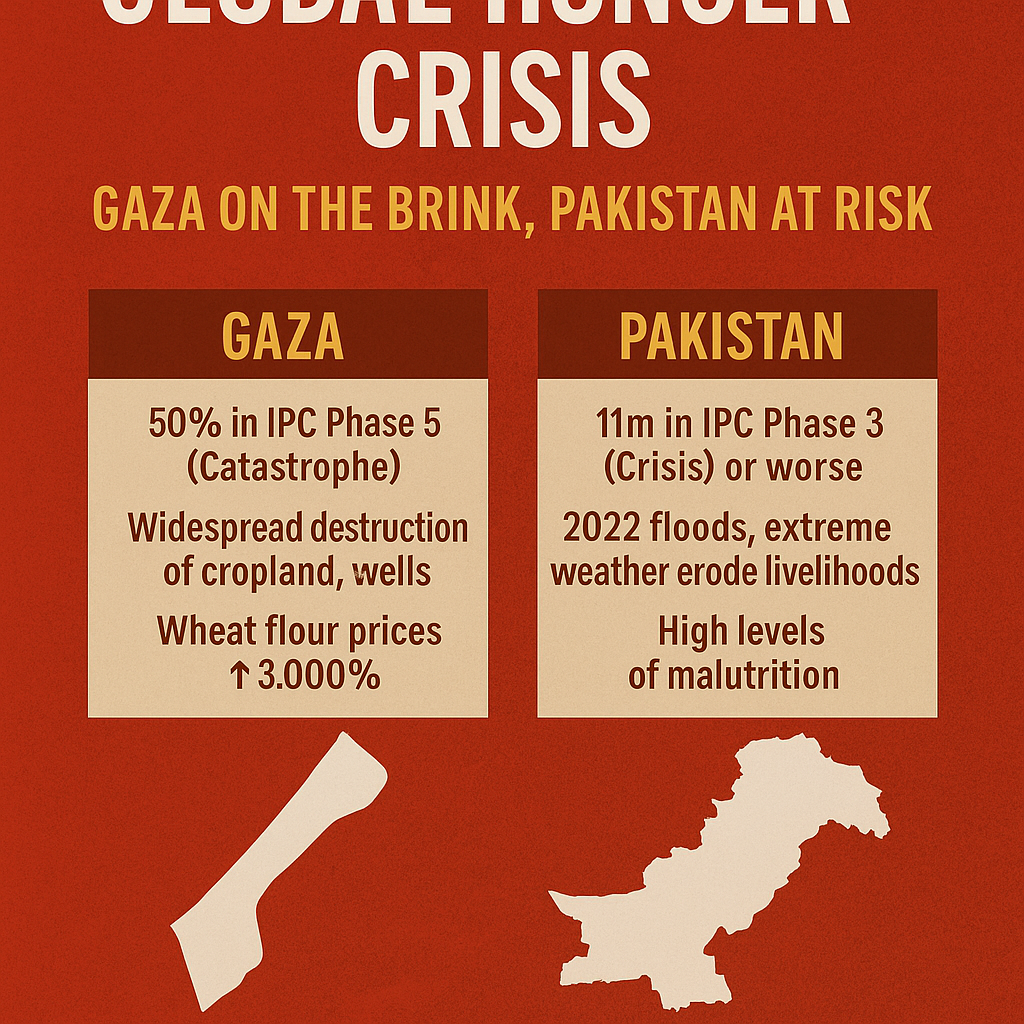Global Hunger Crisis: Gaza on the Brink, Pakistan at Risk
As we move deeper into 2025, the world is facing an escalating food security emergency. According to the latest Global report on food crisis the number of people experiencing high levels of acute food insecurity is the highest ever recorded. Conflict, economic shocks, and climate disasters are pushing vulnerable populations to the edge—and in some regions, over it.
No place illustrates this human catastrophe more starkly than Gaza, where the entire population of over 2.1 million people is now trapped in a web of starvation, siege, and suffering. But Gaza isn’t alone. From northern Pakistan to the drought-stricken Horn of Africa, hunger is becoming a global phenomenon—and political inaction is letting it happen.
Gaza: Starvation by Design
The humanitarian situation in Gaza has become apocalyptic. As of March 2024, over half the population was classified at IPC Phase 4 (Emergency), while a staggering 50% were in IPC Phase 5 (Catastrophe)—the last step before an official famine declaration. These are not just numbers. They represent real families, children, and communities enduring daily misery with no end in sight.
The root cause isn’t merely bad luck or natural disaster—it’s political policy. Gaza’s economy has been strangled by a 17-year blockade, compounded by frequent military escalations. Basic infrastructure has been shattered. By the end of 2024:
- 75% of cropland was destroyed
- 57% of greenhouses were obliterated
- 68% of wells were made inoperable
The destruction of Gaza’s food systems is systematic. In North Gaza and Gaza governorates, 70% of the population now survives solely on humanitarian aid, which is not only insufficient but erratic. To make matters worse, food prices have surged beyond imagination. Between February and April 2025, the cost of wheat flour rose by 3,000%.
This is not just a failure of governance—it’s a violation of human dignity. As famine looms, humanitarian access remains severely restricted. Aid trucks entering Gaza are far below pre-conflict levels, and every delay worsens the crisis. Global silence is not neutrality; it’s complicity.
Pakistan: A Growing Storm Beneath the Surface
While Gaza’s tragedy dominates headlines, Pakistan is quietly edging toward its own food security tipping point. Although food inflation dipped to 0.3% by December 2024, that statistic hides a deeper truth. Persistent poverty, rising unemployment, and climate shocks are undermining household access to nutrition—especially in the country’s most vulnerable regions.
The 2022 floods left long-term damage that Pakistan has yet to recover from. Recurrent extreme weather events in 2023 and 2024, including erratic rainfall, droughts, and early frosts, have dealt further blows to already fragile livelihoods. Farmers in Balochistan, Sindh, and Khyber Pakhtunkhwa (KP) have been especially hard-hit, with water scarcity and crop losses forcing many into crippling debt cycles.
The latest IPC assessment reveals a troubling picture:
- 11 million people in Pakistan are in IPC Phase 3 (Crisis) or worse
- 2.2 million are facing IPC Phase 4 (Emergency)
- Malnutrition rates among children, especially in Sindh and KP, are alarmingly high
In these regions, low birth weight, child stunting, and high infection rates from diarrhoea and respiratory illness are accelerating the downward spiral. Compounding these challenges is a global reduction in humanitarian funding, which has led to scaled-down food assistance programs when they’re most needed.
A Global Crisis, Fueled by Political Neglect
What unites Gaza and Pakistan—and indeed most hunger hotspots—is not just food scarcity, but policy failure. Food insecurity in 2025 is largely man-made. It is rooted in:
- Protracted conflict and political instability
- Climate-induced agricultural loss
- Economic inequality and fragile safety nets
- Restriction of aid for geopolitical gain
In Gaza, it is the result of an intentional siege and destruction of civilian infrastructure. In Pakistan, it’s a dangerous cocktail of natural disaster, economic fragility, and underfunded social protection.
This is not simply a humanitarian challenge. It’s a moral one.
What Must Be Done: Recommendations for Pakistan
While international actors must demand an immediate ceasefire and unrestricted humanitarian access to Gaza, Pakistan’s government must act now to prevent a deeper crisis within its own borders. The following steps are critical:
1. Strengthen Social Safety Nets
Existing poverty alleviation programs like the Benazir Income Support Programme (BISP) must be expanded with a special focus on food assistance, child nutrition, and maternal health.
2. Scale Up Nutrition-Focused Interventions
Targeted support is essential in Sindh and KP. Government and NGO partnerships should focus on mobile health clinics, school feeding programs, and vitamin supplementation to reduce child mortality.
3. Invest in Climate-Resilient Agriculture
Introduce drought-resistant crop varieties, improve irrigation infrastructure, and train farmers in climate-smart techniques to reduce risk and improve yields.
4. Enhance Water Security
Pakistan must take steps to secure its water future, including reforestation, building rainwater harvesting systems, and ensuring fair access to water in drought-prone regions.
The Road Ahead: A Choice for Humanity
The question is not whether we have the resources to end hunger. The world grows enough food. The problem is how that food is distributed—and how hunger is weaponized in times of conflict. Food should never be used as a tool of war.
In Gaza, the world must say: enough.
In Pakistan, the state must act: now.
And globally, we must remember: hunger is not inevitable—it is a choice we allow.
As millions go to sleep tonight without food, as children face another day with empty stomachs and no certainty of survival, we must ask ourselves:
How long can humanity endure this silence?
